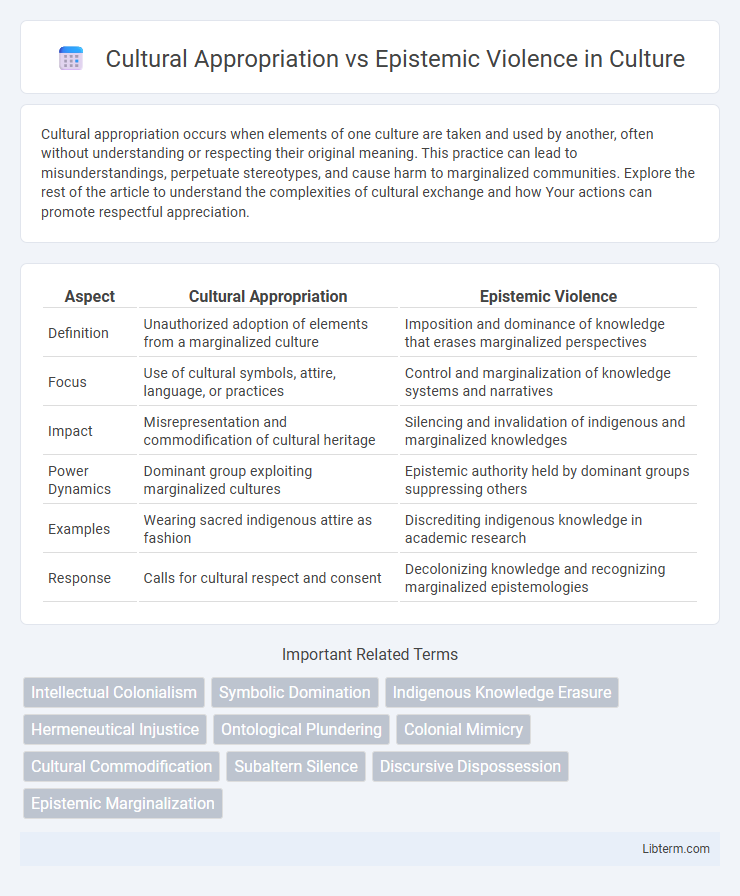Cultural appropriation occurs when elements of one culture are taken and used by another, often without understanding or respecting their original meaning. This practice can lead to misunderstandings, perpetuate stereotypes, and cause harm to marginalized communities. Explore the rest of the article to understand the complexities of cultural exchange and how Your actions can promote respectful appreciation.
Table of Comparison
| Aspect | Cultural Appropriation | Epistemic Violence |
|---|---|---|
| Definition | Unauthorized adoption of elements from a marginalized culture | Imposition and dominance of knowledge that erases marginalized perspectives |
| Focus | Use of cultural symbols, attire, language, or practices | Control and marginalization of knowledge systems and narratives |
| Impact | Misrepresentation and commodification of cultural heritage | Silencing and invalidation of indigenous and marginalized knowledges |
| Power Dynamics | Dominant group exploiting marginalized cultures | Epistemic authority held by dominant groups suppressing others |
| Examples | Wearing sacred indigenous attire as fashion | Discrediting indigenous knowledge in academic research |
| Response | Calls for cultural respect and consent | Decolonizing knowledge and recognizing marginalized epistemologies |
Understanding Cultural Appropriation: Definitions and Examples
Cultural appropriation involves the adoption of elements from one culture by members of another culture, often without permission or understanding, leading to misrepresentation or exploitation. Examples include fashion brands using Indigenous patterns without consent or non-Black artists profiting from Black music styles while ignoring the culture's history. Understanding cultural appropriation requires recognizing power imbalances and respecting the significance of cultural symbols and practices.
What Is Epistemic Violence? A Conceptual Overview
Epistemic violence refers to the systematic harm caused to marginalized groups through the suppression, distortion, or devaluation of their knowledge systems and ways of knowing. It occurs when dominant cultures impose their epistemologies, invalidating indigenous or alternative narratives and perpetuating inequality in knowledge production. Understanding epistemic violence is crucial to addressing the broader impacts of cultural appropriation and power imbalances in knowledge representation.
Historical Context of Cultural Appropriation
Cultural appropriation has deep historical roots tied to colonialism and imperialism, where dominant cultures extracted elements from marginalized groups without consent or understanding. This extraction often reinforced power imbalances, perpetuating stereotypes and misrepresentations that erase authentic cultural identities. The historical context reveals how cultural appropriation functions as a form of epistemic violence, silencing and devaluing the knowledge systems inherent in oppressed communities.
The Roots and Impact of Epistemic Violence in Knowledge Production
Epistemic violence originates from systemic exclusion and marginalization of knowledge systems belonging to oppressed groups, thereby perpetuating colonial and hegemonic paradigms within academia and society. This form of violence distorts the authenticity of marginalized epistemologies by appropriating, misrepresenting, or dismissing their contributions, which limits intellectual diversity and reinforces power imbalances in knowledge production. The impact manifests in the erasure of indigenous, feminist, and other marginalized voices, resulting in skewed research outcomes and policies that fail to address or recognize the complexities of diverse lived experiences.
Intersectionality: When Cultural Appropriation Becomes Epistemic Violence
Cultural appropriation becomes epistemic violence when dominant groups extract and exploit marginalized cultures, perpetuating systemic power imbalances and undermining authentic knowledge production. Intersectionality reveals how overlapping identities--such as race, gender, and class--intensify the harm caused by cultural misrepresentation and erasure. This convergence not only distorts cultural narratives but also invalidates lived experiences, reinforcing structural inequities across social domains.
Power Dynamics: Who Gets to Represent Whom?
Cultural appropriation involves dominant groups adopting elements of marginalized cultures, often without consent, reinforcing existing power imbalances and erasing the original context. Epistemic violence occurs when knowledge systems of oppressed communities are dismissed or distorted by those in power, invalidating lived experiences and perpetuating inequality in representation. The core power dynamic centers on who holds authority to narrate, define, and legitimize cultural identities, raising critical questions about authenticity and agency in representation.
Cultural Exchange vs. Appropriation: Where’s the Line?
Cultural exchange involves respectful sharing of traditions and knowledge, fostering mutual understanding and appreciation between communities, while cultural appropriation occurs when dominant groups exploit or misrepresent elements of marginalized cultures without consent or acknowledgment. The line is crossed when power imbalances lead to the erasure or commodification of cultural practices, reinforcing epistemic violence by silencing or devaluing marginalized voices. Recognizing these dynamics requires critical awareness of historical context, intent, and impact on the communities from which cultural elements are derived.
Case Studies: Real-World Manifestations of Epistemic Violence
Case studies of epistemic violence reveal how cultural appropriation often perpetuates systemic marginalization by distorting or erasing Indigenous knowledge systems. For example, the commercialization of Native American symbols by fashion brands not only profits from but also invalidates Indigenous epistemologies, reinforcing colonial power dynamics. These real-world manifestations demonstrate that epistemic violence extends beyond individual acts, embedding itself in institutional practices that silence marginalized voices.
Responses and Resistance: Challenging Appropriation and Epistemic Violence
Responses and resistance to cultural appropriation and epistemic violence involve amplifying marginalized voices and promoting authentic representation in media, education, and policy. Activists and scholars emphasize the importance of decolonizing knowledge systems by validating indigenous epistemologies and challenging dominant narratives that perpetuate erasure. Strategies include advocating for intellectual sovereignty, fostering cross-cultural dialogues grounded in respect, and implementing reparative measures to address historical and ongoing injustices.
Towards Ethical Engagement: Rethinking Knowledge and Cultural Representation
Cultural appropriation often results in epistemic violence by misrepresenting and decontextualizing marginalized knowledge systems, thereby reinforcing power imbalances and perpetuating colonial legacies. Ethical engagement requires rethinking how knowledge is produced and represented, prioritizing the voices and agency of indigenous and marginalized communities to ensure accurate, respectful cultural representation. This approach challenges dominant narratives and fosters collaborative frameworks that honor cultural integrity and epistemic justice.
Cultural Appropriation Infographic

 libterm.com
libterm.com